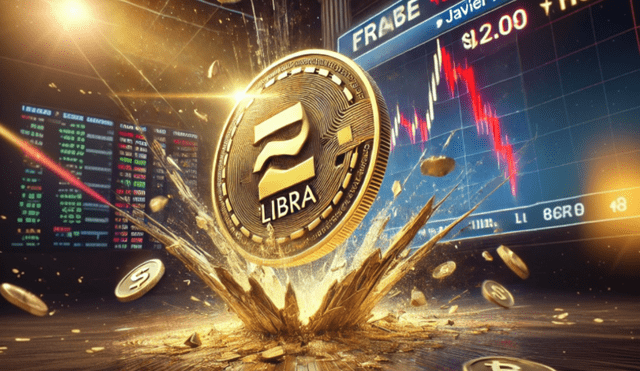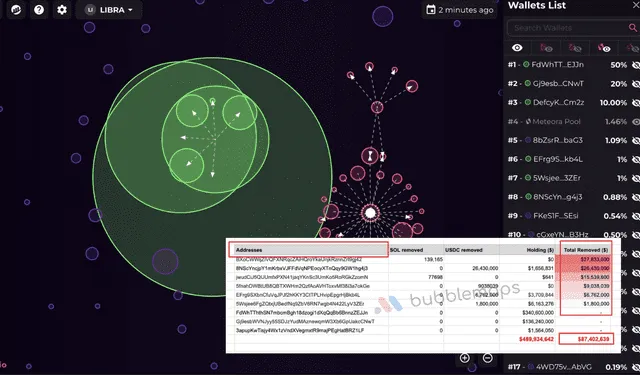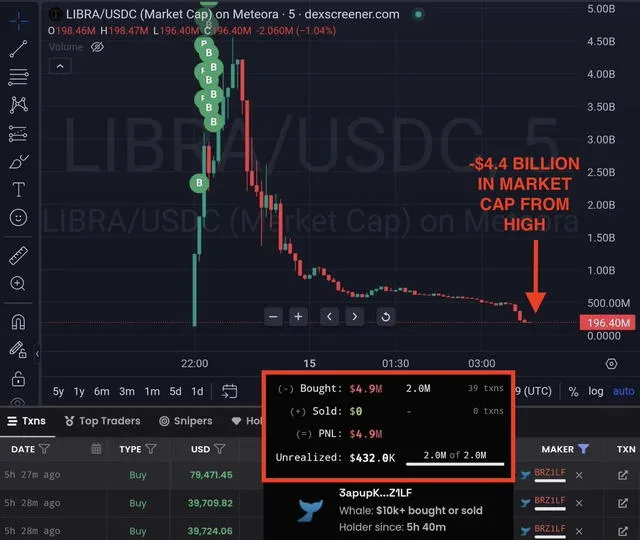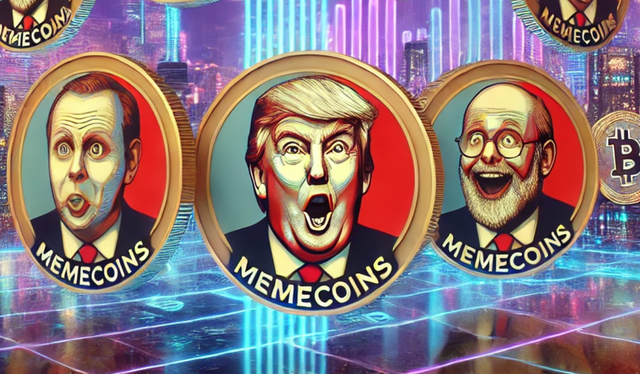$LIBRA cryptocurrency scandal: the memecoin Milei promoted crashed and sent shockwaves worldwide
The collapse of $LIBRA exposes bad practices in the crypto sector and generates a call for greater transparency. Argentina continues as a leader in the use of cryptocurrencies in Latin America, promoting regulations.

At 5:01 p.m. (ET) on February 14, the President of Argentina, Javier Milei, posted a message on the social media platform X that had global repercussions. In it, he promoted the memecoin $LIBRA, a digital asset whose valuation depends on market confidence and its level of adoption.
The token, which was valued at $0.000001 at the time, surged within minutes to $1 and reached a peak of $5.2. However, in just 11 hours—after hitting a market capitalization of $4.56 billion, meaning the total value of all its circulating units—it lost more than 94% of its value, according to Dex Screener, a platform that tracks cryptocurrency prices and movements in decentralized markets.
Today, although the president has denied it, it is estimated that more than 40,000 people have recorded losses exceeding $4 billion. Additionally, the president of the neighboring country is under investigation for abuse of authority, fraud, influence peddling, and bribery in a case led by federal prosecutor Eduardo Taiano.
What is a memecoin?
A memecoin is a digital currency based on a meme or an intellectual property. By bringing together a community or representing a mission, people can give it value by turning it into an asset they can buy, sell, or trade. Its price depends on how many people support it and make it popular.

Memecoins in a futuristic city. Photo: AI/La República
The collapse of $LIBRA
From the beginning, the distribution of $LIBRA was completely manipulated. A single group controlled more than 80% of the total supply, giving them absolute power to move the price at their convenience. However, this information was never disclosed to the public, leading many investors to buy without knowing the real risk.
Just three hours after the launch, insiders or individuals with privileged information began selling their tokens in large quantities, managing to withdraw $87.4 million before the price collapsed. As a result, the supply of tokens in the market increased drastically, causing a sharp drop in its value.
But the insiders' strategy didn’t end there. Instead of selling directly on exchanges, they manipulated the token’s liquidity using Meteora, a financial platform on the Solana blockchain. There, they added large amounts of $LIBRA, making it appear as if there was significant liquidity in the system.

80% of insiders (green) controlled the price of the memecoin $LIBRA. Source: Bubblemaps
However, instead of allowing the market to function fairly, they withdrew the digital dollars (stablecoins) and SOL (another cryptocurrency), which were the funds backing the token, leaving $LIBRA without real financial support.
To understand it better, imagine a currency exchange where people trade money. The creators of $LIBRA put many coins into circulation, but before buyers could exchange their money back, they emptied the vault and took all the real cash. When people wanted to sell their tokens, there was no money left, causing the price to crash.
This move left the token without sufficient financial backing, accelerating the collapse of its price. With each sale, there was less liquidity to sustain $LIBRA’s value, leading to a straight-line decline.

Memecoin $LIBRA today. Photo: The Kobeissi Letter
Involvement with Milei
The link shared in the X post directed users to a Google form for the Viva La Libertad project, sponsored by KIP Network Inc., which was reportedly created shortly before the launch of $LIBRA, according to The Kobeissi Letter, an account specializing in global capital market analysis.
“Today was the launch of the Viva La Libertad project, and the $LIBRA coin has been a success. We want to thank everyone for their trust and support. We want to clarify that President Milei was not and is not involved in any way in the development of this project, which is entirely private. Thank you for being part of this great beginning!” reads their first tweet on that fateful day.
However, it was not until the following day that the organization clarified through its X account that the token launch was “entirely handled by the company Kelsier Ventures, represented by businessman Hayden Davis.”

Javier Milei alongside Julian Peh, co-founder and CEO of KIP Protocol. Photo: Eduardo Garzón/X
By that time, a photo was already circulating showing Javier Milei alongside Julian Peh, co-founder and CEO of KIP Protocol, during a meeting in Argentina on October 19, 2024, as part of the Tech Forum Argentina, which did not dispel suspicions.
Later that same day, Davis himself posted a video confirming that he was behind the launch of the $LIBRA project and that he served as an "advisor to Milei." According to his own admission, he managed to capture the Argentine president’s attention due to his family’s direct ties to Donald Trump, which would also explain his involvement in the $MELANIA memecoin.
"Davis came to me and proposed this. I met him at the fintech event in October 2024, and in that context, he suggested creating a structure to finance entrepreneurs and promote economic growth. I found it to be an interesting tool," Milei said on the local channel Todo Noticias (TN).
After that, and following death threats, Davis is believed to have moved with his family from Dallas (United States), and his whereabouts are now a mystery.

Selfie of Hayden Davis, the crypto entrepreneur who launched $LIBRA, alongside Javier Milei. Photo: Javier Milei/X
Lastly, there is his role as a professor at N&W Professional Traders. This becomes relevant because, before disappearing, Davis mentioned in an interview with the YouTube channel "Voidzilla" the Argentinians Manuel Terrones Godoy and Mauricio Novelli, who were allegedly involved in the development of $LIBRA.
Novelli is the co-founder of the Argentine trading academy, which specializes in training for buying and selling financial assets. In this context, it is understood that the president cannot claim—despite having done so—that he was unaware of the technology behind the token.
It is important to note at this point that the authenticity of the FBI poster showing Javier Milei as one of the 10 most wanted fugitives has been debunked.
"I didn't promote it, I shared it" and "If you go to the casino and lose money, what's the complaint if you knew the risks?" are two of Milei's most viralized statements when asked about the $LIBRA case.
The scandal continued after an unaired segment of an interview for TN about the $LIBRA case was leaked on X, in which Milei's response regarding the government's subsequent actions was abruptly cut off.
As observed, presidential advisor Santiago Caputo allegedly intervened to halt the statement. Subsequently, journalist Jonatan Viale, who conducted the interview, admitted to yielding to pressure to edit the content, stating, "I lacked firmness."

Santiago Caputo interrupted the interview between Javier Milei and journalist Jonatan Viale. Photo: screenshot
Impact on the Crypto World
"$LIBRA was an unfortunate event for the industry. It exposed many of the mistakes and bad practices that have happened and continue to happen, especially with memecoins," said S, the pseudonym used by the community lead of the memecoin Neiro, in an English-language interview with La República.
According to S, regardless of the Argentine president's intentions in promoting the token, the impact was greater than in the cases of $TRUMP and $MELANIA, where insiders also got rich while ordinary people were left in ruin.
The problem is that the scandal involves people with a strong public reputation. When the industry makes headlines for scams and fraud instead of for its success and innovation, its credibility suffers. It will take time to regain public trust so that it can once again be seen with seriousness and respect.
"People will adopt a more critical perspective on memecoins and will expect, and even demand, greater transparency from those who launch and manage them. It will take some time for the market to adapt to this new reality, but it will be for the better," said S.

Reference to the memecoin $TRUMP. Photo: AI/La República.
On the other hand, he highlighted that $LIBRA had a positive effect by strengthening the reputation of projects with a history of transparency and openness. He added that the controversy surrounding this token has driven investors to seek alternatives with a solid track record. In this context, he mentioned Neiro as an example, as it is managed by communities speaking English, Chinese, Turkish, Brazilian Portuguese, Spanish, and other languages. Its value lies in them.
"I believe that when people are scared or angry, the key is education. Latin America has great potential," explained S regarding the impact in Latin America.
$LIBRA is both a warning and a lesson. Events like this can be used to educate people on how to approach the industry by asking key questions: What does the launch of a new token really mean? Who is behind it? How is it distributed? Are there mechanisms in place for unfair profit?
Argentina case
Today, Argentina positions itself as a leader in the Latin American industry, boasting the highest number of users and transaction volume on the continent.
According to Lemon Cash, the country's leading crypto wallet, they have presented, together with the Argentine Fintech Chamber, a tax reform proposal aimed at updating regulations in line with the growing adoption of these assets. The proposal seeks to encourage the use of regulated environments, ensuring transparency and security for users and investors.
"2024 was a key year in the regulatory process for the cryptoasset industry in Argentina. A legal definition for virtual assets was established, and a national registry of Virtual Asset Service Providers (VASP) was created under the National Securities Commission (CNV), a mandatory requirement to operate in the country," Lemon representatives told La República.
This institutionalization has enabled regulatory advancements, such as the possibility of establishing companies with cryptoassets as capital and the fiscal regularization of these assets. However, challenges remain to drive the next wave of crypto adoption in Argentina and expand its use cases across different sectors, including:
- Tokenization of real-world assets.
- A national strategic reserve in Bitcoin.
- Crypto tax proposal.
- Crypto Economic Zone: creation of new tokenized companies under specific regulations.
"At CryptoMKT, we have noticed an increase in inquiries from users concerned about the security of their assets and the level of oversight in the ecosystem. However, by operating within a solid compliance framework and adhering to transparency practices, we have been able to mitigate uncertainty and strengthen our relationship with the community," said María Fernanda Juppet, CEO of CryptoMKT, to this newspaper.
Peru case
In Peru, the Superintendence of Banking, Insurance, and AFPs (SBS) primarily regulates Virtual Asset Service Providers (VASPs) in terms of anti-money laundering (AML) and counter-terrorism financing (CFT) measures.
"The SBS mainly regulates what is known as KYC/AML, which stands for Know Your Customer and Anti-Money Laundering," said Gustavo Cam, CEO of Tulkit Pay, a Peruvian multi-currency wallet, to this newspaper.
This means that crypto exchanges and operators must identify their end users and track transactions to ensure transparency.
However, current legislation does not explicitly address the promotion of virtual assets, leaving a gap regarding how they can be advertised. This becomes relevant in cases like $LIBRA, where mass promotion by a public figure led to speculative price increases.
"Just as IPOs (Initial Public Offerings) in the stock market require detailed financial disclosures, initial coin offerings (ICOs) could be subject to similar disclosure requirements," Cam suggested.
However, the decentralized nature of many cryptocurrencies makes regulation challenging. This means that even if Peru enforces stricter regulations, investors may still participate in these markets through global platforms beyond local supervision.
In summary, although the cryptocurrency industry remains optimistic with Donald Trump in office, further regulatory progress is needed to protect investors and maintain the appeal of what is emerging as the new financial system.